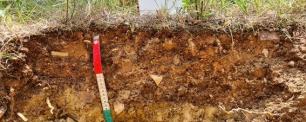ECOFARMERS
Boosting global change adaption in farming and forest systems in the long term: multifunctionality as criteria
The current and future climatic crisis is expected to strongly impact on agricultural and forestry systems, especially in the Mediterranean region. Therefore, an urgent societal challenge is carrying out changes in our management strategies to ensure their resilience and maintenance.
Soil management is a key instrument for their direct link to ecosystem services (ES) and can be used as an adaptive tool to climate harsher conditions, but also to mitigate them.
Farmers and forest owners are therefore not only biomass producers (food and raw materials), but true managers of that and other ES through their management choices. A given management can lead to win-win situations where several ES are simultaneously promoted, in turn providing higher resilience and adaption to climate change. However, the true impacts of management shifts cannot be fully understood without long-term empirical studies in the variety of farming and forestry systems potentially impacted by the climatic crisis, due to the scenario-dependence of ES interactions and the slow response of some soil-mediated ES.
Objective
The project aims to identify successful adaptive managements to the current climatic crisis in different agricultural, pasture and forestry scenarios, the choice being based on the multifunctionality of five ecosystem services (ES): primary production, carbon sequestration, GHG emissions, recycling and pollutant dynamics, and soil organisms biodiversity.
The project also aims to refine the measurement methods of the soil properties used as proxies of ES to avoid any bias, and to discover unintended tradeoffs between ES caused by specific managements.
Finally, we aim to strengthen the consideration of ES as a decision-making tool in farming and forestry environmental policies, as well as discovering the mechanisms behind ES promotion in some managements with transfer potential as scientific and technical knowledge, and as marketable applications, and new business lines and jobs.
Actions
In this project, eight long-term experimental Mediterranean productive systems were selected (4 agricultural, 1 pasture and 3 forestry scenarios). In each scenario, conventional and innovative managements have been applied from several years to decades. These treatments range from different agricultural managements (fertilization, organic amendments or tilling), forest management (thinning to decrease competition for water, forest rehabilitation), to management intended to promote ES benefits other than food or cattle production (cropland afforestation or pasture encroachment).
Proyecto PID2020-114334RB-I00 financiado por MCIN/ AEI /10.13039/501100011033







